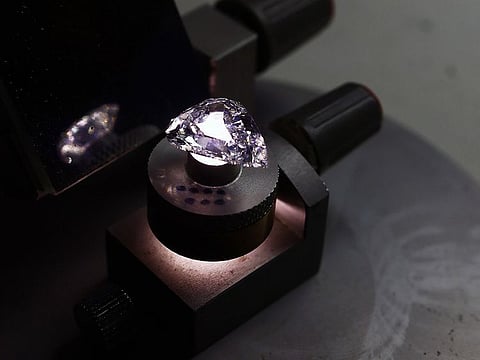Dubai traded over 1b carats of rough, polished diamonds in five years
UAE unveils digital traceability tool, calls for global dialogue on diamond reforms

Dubai: Dubai has been cementing itself as one of the world's most powerful players in the global diamond trade—now with the numbers to prove it.
The UAE has confirmed that more than 1.06 billion carats of rough and polished diamonds were traded through Dubai over the past five years, with 179 million carats traded in 2024 alone. The figures were shared by Ahmed Bin Sulayem, the UAE’s Chair of the Kimberley Process (KP), during the annual Kimberley Process Intersessional Meeting, held last week in Dubai.
The Kimberley Process is a UN-mandated initiative involving 85 countries, designed to prevent conflict diamonds from entering the global market. The UAE currently holds the chairmanship of the KP for the third time, continuing into 2025 under the theme “Year of Best Practice.”
Tech meets tradition
In a major step toward bringing transparency to the centuries-old diamond trade, the UAE also launched “Verifico”, a digital traceability platform designed to secure and track Kimberley Process (KP) certificates across borders. These certificates are crucial for verifying that diamonds entering global markets are conflict-free.
“Verifico is not just a platform—it’s a promise of transparency,” said Ahmed Bin Sulayem. “We are offering it to all KP participants as part of our broader mission to modernise the trade. The time for digital transformation is now.”
The KP Chair called Verifico a “key driver” in the UAE’s campaign to upgrade global diamond governance, aligning with the country's ongoing digital ambitions across multiple sectors.
Call for more engagement
Ahmed Bin Sulayem also proposed the first-ever ministerial meeting of Kimberley Process participants. The goal, he said, is to bring together countries involved in the production, trading, and consumption of diamonds to address key challenges facing the industry and the KP framework.
Once a newcomer to the industry, Dubai has rapidly evolved into a key connector in the diamond supply chain between producer countries in Africa, manufacturers in India, and retailers in the US and Europe.
“There are three markets currently keeping the diamond industry alive,” he said. “The United States as the largest jewellery retail market, India as the cutting and polishing hub, and the UAE as the largest rough diamond hub in the world.”
Rough diamond trading hub
Safeya Hashem Al Safi, Acting Assistant Undersecretary at the UAE Ministry of Economy, noted that Dubai’s rise as a diamond trade hub aligns with the country’s economic diversification goals. “From humble beginnings, Dubai has grown to become the world’s leading rough diamond trading hub,” she said.
Feriel Zerouki, President of the World Diamond Council, acknowledged the progress made under the UAE’s leadership of the KP, particularly in terms of stakeholder collaboration and reform momentum.
Meanwhile, Jaff Bamenjo, representing the Civil Society Coalition, emphasised the importance of delivering on reform goals. He stated that the Coalition expects the KP to make meaningful progress during the final year of its current reform cycle.
UAE's role in Kimberley Process
The UAE first chaired the Kimberley Process in 2016 and is the only Arab country to have done so. Its second term as Chair was in 2024, followed by a continuation into 2025.
Under the leadership of Ahmed Bin Sulayem, who also serves as Executive Chairman and CEO of DMCC (Dubai Multi Commodities Centre), the UAE aims to build on previous efforts to enhance transparency, efficiency, and cooperation within the Kimberley Process.
The 2025 term is positioned as a continuation of recent initiatives, with a focus on implementing best practices and further strengthening the global diamond trade’s regulatory environment.
Why this matters for consumers and investors
While most buyers only see the sparkle, diamond traceability is fast becoming a priority for consumers concerned about ethics and origin. For investors, too, Dubai’s billion-carat milestone signals confidence in the emirate’s status as a global commodities powerhouse—especially as diamonds begin to emerge as a more structured asset class. As the world moves toward more sustainable and transparent supply chains, the UAE’s leadership of the Kimberley Process could shape how diamonds are sourced, tracked, and sold for years to come. And if the numbers are anything to go by, Dubai’s grip on the diamond trade isn’t just holding—it’s sparkling.
Sign up for the Daily Briefing
Get the latest news and updates straight to your inbox



